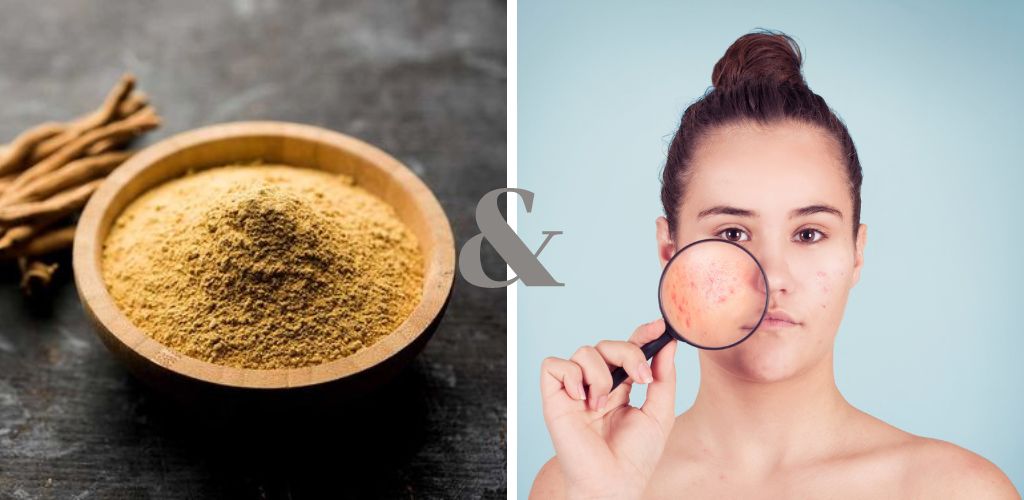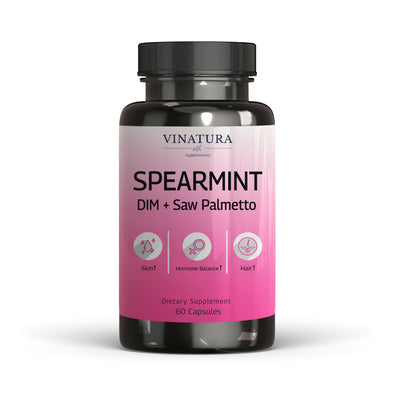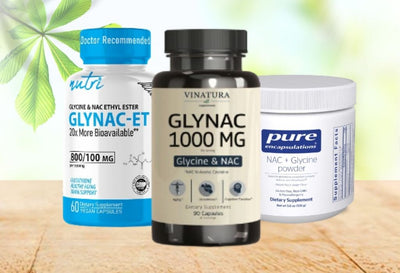
Can Ashwagandha Cause Acne? Does It Clear Or Make Acne Worse?
Ashwagandha is celebrated for its stress-reducing properties, but its impact on acne is complex and multifaceted. While some advocates suggest it can clear skin by lowering cortisol levels, others fear it may exacerbate acne in specific individuals. This article will explore the effects of Ashwagandha on acne to find the answer to the question “Can ashwagandha cause acne?” and whether it heals or harms your skin.
Before exploring further, please read the disclaimer located at the end of this webpage.
Can Ashwagandha Cause Acne?

Ashwagandha, as an adaptogen, is known to regulate hormonal balance and stress levels in the body. While these regulatory effects are often beneficial, they can inadvertently influence factors contributing to acne.
For some individuals, particularly those with sensitivities or allergies to the herb, Ashwagandha can potentially trigger a reaction that may manifest as skin irritation or acne.
However, the evidence is inconclusive, and variations in individual biochemistry mean responses to Ashwagandha can differ significantly.
Further research is required to understand the relationship between Ashwagandha's effects on hormonal activity and acne development.
What Causes Acne?

To answer the query “Can ashwagandha cause acne?”, it’s important to explore the cause of acne.
Acne is typically the result of pores on the skin becoming clogged with oil, dead skin cells, and bacteria. It is closely related to hormonal fluctuations, which can increase oil production in the skin.
Androgens, a group of hormones that includes testosterone, have been known to play a significant role in the development of acne by increasing the size and activity of oil-producing glands.
Stress is also a contributing factor, as it can increase cortisol levels, leading to more oil production. Diet, medications, and genetics are additional elements that can influence kinds of acne such as: cystic acne, hidden acne...
Understanding these fundamental causes is crucial when exploring how substances like Ashwagandha might interact with the mechanisms that lead to acne.
Ashwagandha And Hormonal Acne
Diverging views on the link between Ashwagandha and acne prompt the question: "Does ashwagandha cause hormonal acne?" Let's delve into the connection between Ashwagandha and hormonal acne, looking at two types: testosterone and thyroid hormones.
Testosterone
Testosterone, a gender-specific hormone, plays a significant role in the human body. Abnormal elevations of this hormone can contribute to the development of acne.
Numerous studies have suggested that Ashwagandha may increase testosterone levels in males, while its impact on females is minimal [4, 8]. This could serve as a foundation for exploring the acne-causing potential of Ashwagandha.
Thyroid Hormones
Ashwagandha's impact extends to the thyroid gland, where it has demonstrated its ability to assist in rectifying the parameters in patients with hypothyroidism, thus enhancing thyroid function [1].
Given the crucial role that thyroid hormones play in the body's metabolic processes, any imbalance, even when aimed at therapeutic correction, could potentially result in unintended consequences, such as the development of acne.
Does Ashwagandha Help With Acne?

Despite the potential risk of causing acne, Ashwagandha has other mechanisms that could counteract these risks:
Reducing Cortisol Levels: Cortisol is a stress hormone, and elevated levels have been linked to increased acne severity. Ashwagandha's ability to reduce cortisol levels may help alleviate stress-related acne conditions.
Anti-Inflammatory Properties: Ashwagandha contains bioactive steroids such as withaferin A, 3-b-hydroxy-2, and 3-dihydro withanolide F. These compounds possess anti-inflammatory and anti-microbial properties that help in preventing clogged pores and the worsening of acne [9].
Antioxidant Properties: Recognized for its antioxidant capabilities, Ashwagandha may also fortify the skin's defense against environmental stressors, potentially preventing oxidative damage and promoting skin health [9].
Healing Scar Wound Properties: Some studies have shown that Ashwagandha also has the ability to heal scars due to the properties of Lekhana, Shodhana, Ropana, and Savarnikaran, and it has the potential to heal Dushta vrana.
Therefore, the benefits of Ashwagandha for acne scars are very promising [10].
How To Use Ashwagandha To Avoid Acne Breakout?

While the debate on Ashwagandha's role in acne development persists, the lack of a definitive study means caution is advised. Despite potential hormone-related concerns, Ashwagandha does boast beneficial properties for skin health.
A key preventive measure against unintended side effects, such as abnormal hormonal increases, lies in proper dosage management. It is recommended to begin with a small dose, gradually allowing the body to adapt, and then increase as needed.
Moreover, the significance of a balanced diet cannot be doubted—taking Ashwagandha in conjunction with a diet high in sugars and salts might negate its beneficial effects and exacerbate skin issues.
Therefore, a comprehensive approach, including controlled Ashwagandha consumption and a healthy diet, could minimize the risk of acne breakouts associated with its use.
Other Potential Benefits Of Ashwagandha For Skin

Increased Moisture and Elasticity for the Skin
One less publicized benefit of Ashwagandha is its capacity for improving skin hydration and elasticity.
In a study spanning 60 days, participants applying a moisturizer containing Ashwagandha extract observed a significant improvement in their skin condition, with moisture levels increasing by 20.66% and skin elasticity by 16.34% [7].
This points to Ashwagandha's potential as a key ingredient in skincare regimens to maintain youthful and healthy skin.
Anti-aging Effects
Ashwagandha's impressive antioxidant and anti-inflammatory properties also contribute to its role in combating signs of aging.
Regular use of Ashwagandha-infused skin products can help mitigate the harmful effects of daily UV exposure, resulting in the reduced appearance of wrinkles and age spots, thereby slowing the aging process of the skin [7].
Anti-inflammatory Effects
Various studies have confirmed its efficacy in treating inflammatory skin conditions, offering relief by reducing redness and swelling [7].
Other Remedies For Acne
Apart from herbal supplements like Ashwagandha, conventional treatments such as retinol and antibiotics play a crucial role in acne management:
Retinol: A derivative of vitamin A, has proven effective in acne prevention by normalizing skin cell shedding. This prevents the clogging of pores that can lead to pimple formation [2].
Antibiotics: Antibacterial effects that reduce acne-causing bacteria on the skin and anti-inflammatory properties that soothe the redness and swelling associated with severe acne breakouts [2].
Frequently Asked Questions
Does Ashwagandha Make You Break Out?
In some cases, the diverse hormonal effects of Ashwagandha may lead to the development of acne breakouts in individuals. However, consuming Ashwagandha in moderation and maintaining a healthy diet, the risk of experiencing acne breakouts can be minimized.
Does Ashwagandha Affect The Face?
Correctly supplementing Ashwagandha in the appropriate dosage and manner can provide several advantages for facial skin. These include diminishing acne, moisturizing, anti-aging, and anti-inflammatory effects.
Conclusion
While Ashwagandha may pose a risk for acne breakouts due to its influence on hormones, it offers a suite of skin-enhancing benefits such as antioxidant, and anti-aging properties. With careful usage, particularly regarding dosage and incorporating a healthy diet, this ancient herb can be a valuable addition to skincare routines, combating acne and improving overall skin quality and vitality. Hope this article helps you find the suitable answer to the question “Can ashwagandha cause acne?”.
References
- [1] Gannon, J. M., Forrest, P. E., & Roy Chengappa, K. N. (2014). Subtle changes in thyroid indices during a placebo-controlled study of an extract of Withania somnifera in persons with bipolar disorder. Journal of Ayurveda and Integrative Medicine, 5(4), 241–245. https://doi.org/10.4103/0975-9476.146566
- [2] Haider, A. (2004). Treatment of Acne Vulgaris. JAMA, 292(6), 726. https://doi.org/10.1001/jama.292.6.726
- [3] Kapoor, S., & Saraf, S. (2011). Topical Herbal Therapies an Alternative and Complementary Choice to Combat Acne. Research Journal of Medicinal Plant, 5(6), 650–669. https://doi.org/10.3923/rjmp.2011.650.669
- [4] Lopresti, A. L., Smith, S. J., Malvi, H., & Kodgule, R. (2019). An investigation into the stress-relieving and pharmacological actions of an ashwagandha (Withania somnifera) extract: A randomized, double-blind, placebo-controlled study. Medicine, 98(37), e17186. https://doi.org/10.1097/MD.0000000000017186
- [5] Melnik, B. C. (2011). Evidence for acne-promoting effects of milk and other insulinotropic dairy products. Nestle Nutrition Workshop Series. Paediatric Programme, 67, 131–145. https://doi.org/10.1159/000325580
- [6] Melnik, B., Jansen, T., & Grabbe, S. (2007). Abuse of anabolic-androgenic steroids and bodybuilding acne: an underestimated health problem. JDDG, 5(2), 110–117. https://doi.org/10.1111/j.1610-0387.2007.06176.x
- [7] Narra, K., Naik, S. K., & Ghatge, A. S. (2023). A Study of Efficacy and Safety of Ashwagandha (Withania somnifera) Lotion on Facial Skin in Photoaged Healthy Adults. Cureus. https://doi.org/10.7759/cureus.36168
- [8] Smith, S. J., Lopresti, A. L., Teo, S. Y. M., & Fairchild, T. J. (2020). Examining the Effects of Herbs on Testosterone Concentrations in Men: A Systematic Review. Advances in Nutrition, 12(3). https://doi.org/10.1093/advances/nmaa134
- [9] Syal, S., Pandit, V., & Ashawat, M. S. (2020). Traditional herbs to treat acne vulgaris. Asian Journal of Pharmaceutical Research, 10(3), 195. https://doi.org/10.5958/2231-5691.2020.00034.9
- [10] Sombir Sheoran, Khanam, B., Vyasadeva Mahanta, & Sanjay Kumar Gupta. (2020). Efficacy of Ashwagandha [Withania somnifera (Linn.) dunal] leaf paste in the management of chronic non-healing wound: A case report. Journal of Ayurveda Case Reports, 3(3), 95–95. https://doi.org/10.4103/jacr.jacr_46_20
Author

Product Disclaimer
The dietary supplement products mentioned on this website are formulated based on scientific research and adhere to FDA guidelines for dietary supplements. However, the content of the articles has not been evaluated by the Food and Drug Administration (FDA) and is not intended to promote or endorse any specific product. Any products sold on this website are not intended to diagnose, treat, cure, or prevent any disease.
Opinions and Endorsements
Any claims, statements, or opinions expressed in the articles are those of the author(s) and do not necessarily reflect the views or opinions of the manufacturers of the dietary supplement products. The products sold on this website are separate from the content of the articles and are not directly endorsed or associated with the information presented here.
Liability Disclaimer
The author(s) of the articles, website, and manufacturers of the dietary supplement products do not assume any liability for any potential consequences arising from the use of the information provided in the articles. It is recommended that individuals consult with a qualified healthcare professional before making any dietary or lifestyle changes, including the use of dietary supplements.
Product Usage
Please refer to the product labels and packaging for specific usage instructions and guidelines for the dietary supplement products sold on this website.
Customer Support
For any concerns or questions regarding the dietary supplement products, please contact our customer support team, who will be more than happy to assist you.





Leave a Comment
Be the first to comment.
What do you think?